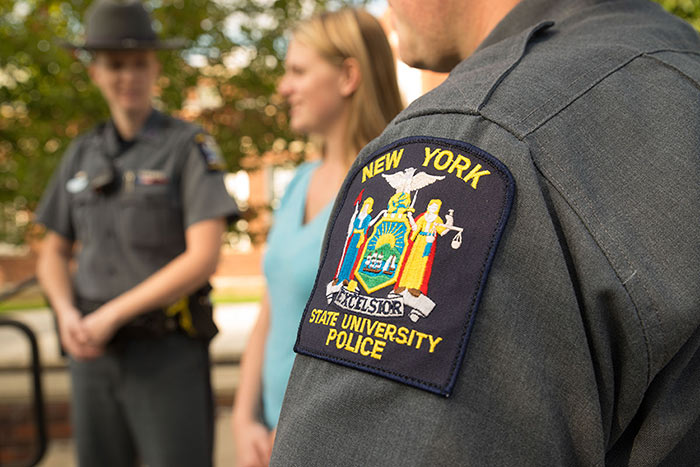
Qualifications
In order to qualify for the civil service exam to become a University Police Officer, candidates must possess either: 60 college credits, or two years of active military service with an honorable discharge may be substituted for 30 of the 60 hours of college credit. This educational requirement is a higher standard than many municipal or county law enforcement agencies. Many officers in University Police possess Bachelor's and/or Master's degrees. Following the written test, candidates who scored high enough to be reachable must pass a standardized physical test that involves push-ups, sit-ups, and a 1.5-mile run. Following the physical agility testing, candidates advancing must clear psychological and medical screening. In addition, substantial background testing/checking takes place, including fingerprinting.
The Job
A University Police officer is responsible for the detection and prevention of crime and the enforcement of state and local laws, rules, and regulations in a diverse educational environment throughout twenty-eight State University of New York campuses.
Officers are part of the educational process and teach on such topics as crime prevention, drug awareness, sexual assault and traffic safety. They develop and maintain a positive relationship with students, faculty and staff in order to ensure the safety and cooperation of the entire campus community.
Dates and applications for entrance examinations can be obtained from your nearest NYS Employment Office or on the New York State Department of Civil Service website.
Our Philosophy
Our Community Policing philosophy promotes organizational strategies that support the systematic use of partnerships and problem solving techniques, which proactively address the immediate conditions that give rise to public safety issues such as crime, social disorder, and fear of crime. These ideas are not new; they were originally championed by Sir Robert Peel, the father of modern policing. He was Home Secretary of the United Kingdom (1822—1835) and during his tenure he established the Metropolitan Police Force in 1829. This was the first standardized professional police force in London. The original police force members were nicknamed "bobbies" in honor of Peel by the citizens, a term which is still used today. Although unpopular with the community at first, the force proved successful in reducing crime in London. This was attributed in large part to the nine principles that Peel obliged his police to follow.
The State University Police Departments are uniquely positioned to achieve lasting reductions in crime and disorder in our communities. Our operational philosophies and the close working relationships we have with our campus communities allow us to spend positive, non-enforcement time in and among our students, faculty and staff. In most instances we have the “luxury” of time that our surrounding municipal departments often lack. Rather than racing from one 9-1-1 call to another, we have the opportunity to engage our communities through educational programming, crime prevention efforts and community outreach and become a valued and trusted part of the community. In total, the State University Police Departments more closely meet Robert Peels’ time-tested model for an effective, community-based police department than any other police agency at the State or municipal level.
The Peelian Principles
- The basic mission for which the police exist is to prevent crime and disorder.
- The ability of the police to perform their duties is dependent upon the public approval of police actions.
- Police must secure the willing co-operation of the public in voluntary observation of the law to be able to secure and maintain the respect of the public.
- The degree of co-operation of the public that can be secured diminishes proportionately to the necessity of the use of physical force.
- Police seek and preserve public favor not by catering to public opinion, but by constantly demonstrating absolute impartial service to the law.
- Police use physical force to the extent necessary to secure observance of the law or to restore order only when the exercise of persuasion, advice, and warning is found to be insufficient.
- Police, at all times, should maintain a relationship with the public that gives reality to the historic tradition that the police are the public and the public are the police; the police being only members of the public who are paid to give full-time attention to duties which are incumbent upon every citizen in the interests of community welfare and existence.
- Police should always direct their action strictly toward their functions, and never appear to usurp the powers of the judiciary.
- The test of police efficiency is the absence of crime and disorder, not the visible evidence of police action in dealing with it.
The Requirements
University Police Officers must meet the highest standards in New York State, as well as in the country, for law enforcement officers.
To become a University Police Officer, a person must:
- Be at least 21 years of age
- Must not have reached their 35th birthday
- Be a United States Citizen
- Be a New York State Resident
- Have completed 60 hours of college credits or two years of active military service with an honorable discharge may be substituted for 30 of 60 hours of college credit hours
- Possess a valid NYS drivers license
- Pass a written Civil Service Exam and be reachable on their list for canvassing
- Pass a medical examination
- Have binocular acuity of 20/30 corrected or no less than 20/100 uncorrected
- Pass a physical agility test (see agility chart)
Agility Chart
MALE Sit-up/min. Push-up 1.5 Mile Run 20-29 38 29 12:38 30-39 35 24 12:58 40-49 29 18 13:50 FEMALE Sit-up/min. Push-up 1.5 Mile Run 20-29 32 15 14:50 30-39 25 11 15:43 40-49 20 9 16:31 - Pass a psychological examination
- Pass an extensive background investigation
- Complete a Basic School for Police Officers
- Complete a probationary period
The Training
Upon successful completion of the selection process, recruits begin training at a Basic School for Police Officers. Recruits will receive training in such areas as:
- Criminal Procedure Law
- Penal Law
- Investigation Procedures
- Report Writing
- Vehicle and Traffic Law
- Accident Investigation
- Emergency Medical Services
- Emergency Vehicle Operations
- Communications
- Firearms Training
- Community Relations
- Crime Prevention
- Physical Fitness/Wellness
- Defensive Tactics
- Supervised Field Training
- Police Functions

